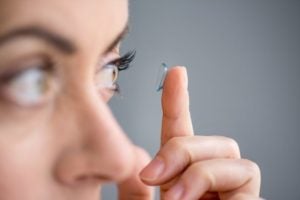-
How to Get Relief from Eye Allergies

If you’re allergic to pollen, dust, mold or pet dander, you may struggle with watery, swollen, itchy eyes. Thankfully, at-home and prescription remedies are available. Here are some different approaches you can take to get relief from eye allergies.
At-Home Remedies for Preventing and Relieving Mild Eye Allergies
For many people, it’s possible to avoid allergy triggers and relieve symptoms with DIY methods. Here’s what to try first.
- Keep the windows shut, especially in the morning and evening when pollen counts tend to be at their highest.
- Cover pillows with hypoallergenic pillowcases to reduce your exposure to dust mites, and wash your bedding weekly in hot water.
- Keep your pet out of the bedroom to reduce your exposure to pet dander while you sleep.
- Dust and mop often to remove pet hair and dust from hard surfaces.
- Wear wraparound sunglasses to protect your eyes from pollen when mowing the lawn or engaging in other outdoor activities.
- Remove your contact lenses, which can attract airborne allergens. Consider wearing eyeglasses throughout allergy season.
- Gently clean your eyelids before bed to remove pollen and other allergens that could irritate your eyes while you sleep.
- Place a cool washcloth on your eyes to relieve swelling and itching.
- Rinse your eyes with saline solution or artificial tears to help flush out allergens.
- Apply allergy eye drops to combat your symptoms. Wait at least 15 minutes before putting in contact lenses.
- Take oral antihistamines or other over-the-counter allergy medications.
Prescription Remedies for Moderate to Severe Eye Allergies
When DIY methods aren’t enough to combat your persistent symptoms, ask your eye doctor what other options are available. Here are some prescription eye drops and oral medications you may want to try.
- Antihistamines reduce eye allergy symptoms by blocking histamine cells that generate an allergic response.
- Decongestants help you breathe easier by shrinking swollen nasal passages. They also relieve redness by reducing the size of blood vessels in the whites of your eyes.
- Mast cell stabilizers prevent mast cells from releasing histamines. Because it takes weeks for mast cells to reach their full potential, you should take this medicine as a preventatives measure rather than a treatment for existing symptoms.
- Nonsteroidal anti-inflammatory drug (NSAID) eye drops decrease swelling caused by seasonal allergic conjunctivitis, also known as hay fever.
- Corticosteroid eye drops relieve acute eye allergy symptoms. They are designed for short-term use only because of the complications that can arise with prolonged use.
- Immunotherapy is a treatment for people with severe allergies. You achieve long-term relief after a few months of injections that help you build up immunity to certain
Eye allergies aren’t the other thing that can affect your eye health. Keep your vision clear with regular visits to Gerstein Eye Institute. To schedule an eye exam in Chicago, IL, please contact us at 773.596.9545 today. We have been offering preventative eye care since 1968.
-
Everything You Need to Know about Contact Lenses
 Are you tired of your glasses fogging up or getting in the way of the activities you love? If so, it could be time to try contact lenses, a vision correction option that millions of people utilize today. Learn more about contact lenses before you make the switch.
Are you tired of your glasses fogging up or getting in the way of the activities you love? If so, it could be time to try contact lenses, a vision correction option that millions of people utilize today. Learn more about contact lenses before you make the switch.Brief History of Contact Lenses
In the 1500s, Leonardo da Vinci became the first person to conceptualize wearing corrective lenses directly on the eye. However, it wasn’t until 1887 that the first glass contact lenses were manufactured.
Drastic advancements have been made in the field of contact lenses over the last 80 years. The materials used have evolved from glass to plastic to acrylate to silicone-hydrogel, and the structure has changed from covering the entire eye to just the cornea. Contacts are more comfortable and breathable today than ever before.
Types of Contact Lenses
- Soft lenses range from daily disposables to two- and four-week lenses that require cleaning and storage between each use.
- Rigid gas-permeable (RGP) lenses are harder and smaller than soft lenses. You get crisp, clear vision from lenses that last a year or two, but they may be uncomfortable at first.
- Scleral lenses cover more of the eye. They are suggested for people with irregular corneas or severe dry eye.
- Toric lenses are available in soft and RGP form. They are shaped to correct astigmatism, which is when the cornea is pointed rather than spherical.
Contact Lens Eye Exams
The exams for prescribing contact lenses are more in-depth than regular eye exams. In addition to checking your vision to determine your prescription, the exam also assesses the shape and health of your eyes to ensure you’re a good candidate for contact lenses.
If you’re new to contacts, your eye doctor will select trial lenses for you to test out. You’ll receive instructions for putting them in and taking them out, and you’ll wear these contacts home to see how you like them. You may need a follow-up exam to discuss any discomfort and try other styles and brands. When you’re ready, your eye doctor will help you order a one-year supply of the contacts you prefer.
Contact Lens Tips
- Wash and dry your hands before putting contacts in or taking them out.
- Put in your contacts before applying eye makeup.
- Don’t sleep, swim or shower while wearing contact lenses.
- Store your contacts in fresh contact lens solution every night.
- Replace your contacts as often as your eye doctor recommends.
Contact lenses are the right solution for many people who require vision correction. If you’re interested in trying out contacts for the first time, call Gerstein Eye Institute at 773.596.9545. We’ll set up an eye exam for you at our Chicago, IL office, where our eye doctor will fit you with the proper lenses and teach you how to insert and remove them correctly. We’ll also explain how to clean and store contact lenses to help keep your eyes healthy.
